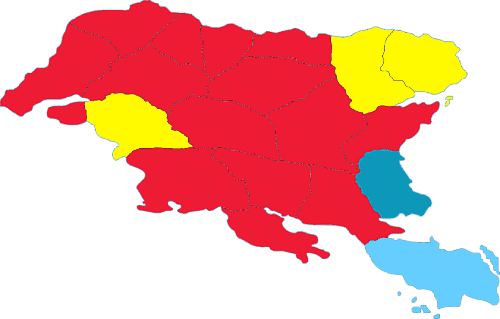Gylian presidential election, 1961
| |||||||||||||||||
| Turnout | 95,2% | ||||||||||||||||
|---|---|---|---|---|---|---|---|---|---|---|---|---|---|---|---|---|---|
| |||||||||||||||||
File:Gylias-elections-presidential-1961-final.png | |||||||||||||||||
| |||||||||||||||||
Presidential elections were held in Gylias on 22 May 1961. They were the first presidential elections, held after the Constitution was adopted and the post established.
Several well-known political and civic figures ran for office, establishing the tone and character of subsequent presidential elections. Independent candidate Eiín Dairyn unexpectedly won a plurality of first preference votes, and was elected in the final distribution, defeating the Progressive Alliance-supported Maléna Laryn.
Procedure
The election is held through instant-runoff voting.
Candidates are registered with Elections Gylias in accordance with normal procedures. They could either be nominated by a political party or electoral bloc, civic organisations, or self-nomination as independents.
Candidates
| Candidate | Nominator | Office(s) held | Details | ||
|---|---|---|---|---|---|
| Eiín Dairyn | File:EiínDairyn.jpg | Independent | None | Campaigned on promotion of the arts and culture. | |
| Maléna Laryn | File:MalénaLaryn.jpg | Progressive Alliance | None | Campaigned on promotion of gender and sexual revolution. | |
| Hildegard Riese | 
|
Union for a New Republic | None | Campaigned as the main conservative candidate. | |
| Donatella Rossetti | 
|
Liberal Union | Governor of Alscia (1908–1939) Delegate to the General Council (1939–1958) Member of the Popular Assembly (since 1958) |
Campaigned as the main Donatellist–liberal candidate. | |
| Arlette Gaubert | 
|
Centre Group | Chief executive of Gaulette (1914–1939) Delegate to the General Council (1940–1958) Member of the Popular Assembly (since 1958) |
Campaigned on promotion of industrial paternalism. | |
| Françoise Chatelain | 
|
OMFLG–ACFEN | None | Campaigned on promotion of francité. | |
| Junko Maruo | 
|
Veterans for a Just Peace | None | Campaigned on Liberation War veterans' issues. | |
| Luiza Monteira | 
|
Centre of Constitutional Monarchists | None | Campaigned on promotion of monarchism. | |
Results
| Candidate | Nominator | First count | % | Final count | % | |
|---|---|---|---|---|---|---|
| Eiín Dairyn | Independent | 1.247.756 | 28,2% | 2.068.820 | 51,1% | |
| Maléna Laryn | PA | 951.304 | 21,5% | 1.979.751 | 48,9% | |
| Hildegard Riese | UNR | 623.878 | 14,1% | |||
| Donatella Rossetti | LU | 451.316 | 10,2% | |||
| Arlette Gaubert | CG | 424.768 | 9,6% | |||
| Françoise Chatelain | OMFLG–ACFEN | 331.850 | 7,5% | |||
| Junko Maruo | VFJP | 199.110 | 4,5% | |||
| Luiza Monteira | CCM | 141.589 | 3,2% | |||
| Others/write-ins | 53.096 | 1,2% | ||||
| Total | 4.424.668 | 100% | 4.048.571 | 100% | ||
| Registered voters and turnout | 4.682.882 | 95,2% | ||||
Maps
Analysis
In contrast to the 1958 Popular Assembly election, which used nationwide party-list proportional representation, this was the first federal election to use ranked voting and regional counts, allowing for a better measurement of federal political trends.
In the first count, Donatella Rossetti won a plurality in Arxaþ and Alţira, trailed by Hildegard Riese and Arlette Gaubert, with the other candidates performing poorly. Commentators attributed this to "Alscian nostalgia", with Donatella, Hildegard, and Arlette being famous representatives of the "hurried province".
Junko Maruo performed notably well in Salxar and Makarces, and narrowly won a plurality in Herlan, aided by the ongoing Arnak Trials. Luiza Monteira won a plurality in the Daláyk islands, although Hildegard won Nerveiík-Iárus-Daláyk as a whole.
Eiín Dairyn's strong performance was the main surprise: she won pluralities in southern Gylias and finished first overall, with 28,2% of first preference votes.
In the final count, Eiín generally gained transfers from Hildegard, Arlette, and Luiza's voters, while Maléna received most of the transfers from Françoise and Junko's voters. Transfers from Donatella were more evenly split, as Eiín and Maléna were equally appealing to liberal voters.
While Maléna retained most of the regions she had won in the first count, including Mişeyáke, she crucially lost several of the largest regions to Eiín, particularly Nerveiík-Iárus-Daláyk, Elena and Tomes.
Notably, the northern regions of Salxar, Makarces, Gacar, and Gerşyr, which had given pluralities to Maléna in the first count, switched to Eiín in the final count. Although their voters leaned left generally, Maléna's hétaïre image and association with socialised luxury did not resonate with the largely rural and mountainous regions.
